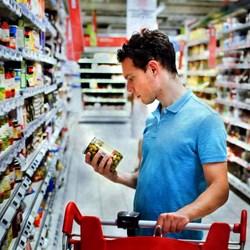


Food manufacturers wanting to emphasise that all their ingredients and raw materials come from Belgium and that they also make the products in Belgium can record this voluntarily(!) on the label. This is permitted by the EU’s Food Information to Consumer (FIC) Regulation 1169/2011.

© Shutterstock
Foodstuffs produced using more than one ingredient are so-called "composite" products. European, and hence Belgian, legislation establishes that the country of origin is the country where the last significant economically significant processing or working took place.
No compulsion
The Belgian food industry federation FEVIA is not in favour of mandatory origin labelling for two reasons, explains its communications director Nicholas Courant. "Firstly, because mandatory origin labelling may encourage protectionism and is fundamentally at odds with the principles of the single European market. Secondly, because while consumers are happy to have information on the origin of food products, they are less willing to pay more for it." He points to consumer studies showing that consumers choose food primarily on the basis of price, quality and taste. "Fortunately, there is also a tendency to pay more attention to sustainability."
The best of both worlds
Voluntary origin labelling, Fevia says, is the best of both worlds. "For consumers who are willing to pay more for information on origin, the European Regulation provides clear protection against deception, and producers who want to stand out can do so voluntarily," Courant points out. "At the same time, the EU Regulation also meets the needs of more price-sensitive consumers and provides a workable framework for food producers who want to source their ingredients flexibly to meet this demand. What's more, companies are sometimes forced - because of food safety incidents or for political reasons - to obtain their ingredients from a different source."

“It is always advisable to maintain a critical perspective on your own products and adjust them to contemporary needs where necessary”, emphasises Marijke Adriaens, CEO of frozen food company Fribona. “For consumers, taste is still the main consideration. It is essential to work towards a product that is, above all, tasty and visually appealing.”...

Scientists from KU Leuven have discovered how oil penetrates snacks during and after the frying process. Recent research findings point to advanced frying techniques that reduce oil absorption, as well as innovative methods to limit oil uptake during the cooling phase. This paves the way for the development of healthier snacks without compromising...

Food companies are increasingly targeting a wider range of consumer groups. Speaking at an event organised by Fenavian, Julian Mellentin of New Nutrition Business said this strategy offers significant opportunities to respond to the diverse health needs and interests of today’s consumers. “Consumers enjoy both animal and plant-based proteins”, he...

Backed by financial partners, Start it @KBC is launching the accelerator programme Scale it Agro, aimed at scale-ups offering sustainable and innovative agricultural solutions for agriculture and horticulture businesses. Kjell Clarysse, programme director at Scale it Agro, goes into more detail.